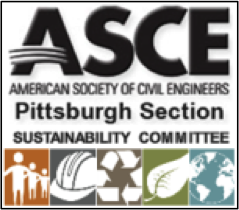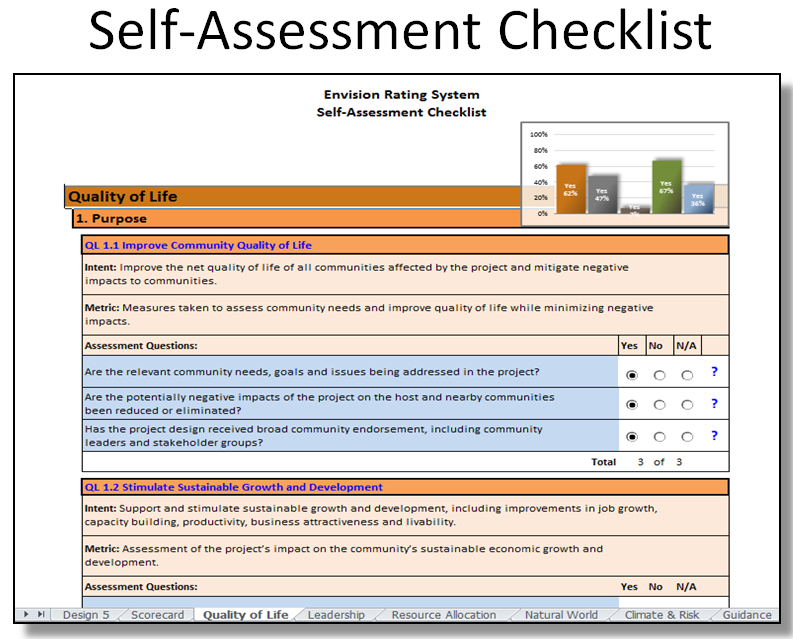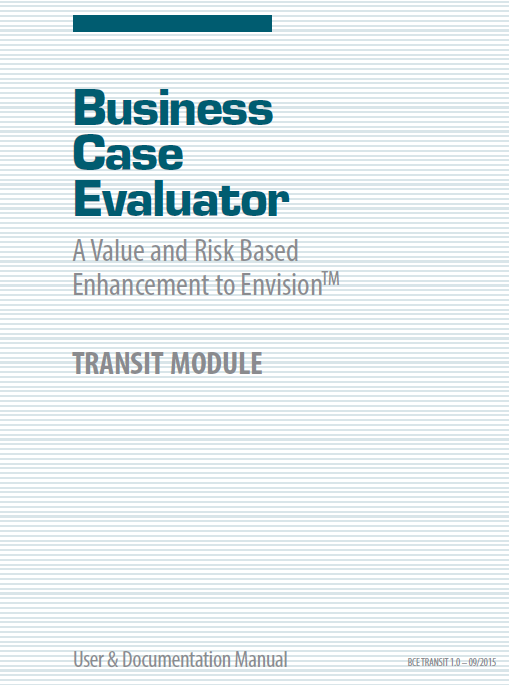 Tom Batroney, PE, ENV SP, M.ASCE – ASCE Pittsburgh Sustainability Committee Chair
Tom Batroney, PE, ENV SP, M.ASCE – ASCE Pittsburgh Sustainability Committee Chair
Jason J. Borne, PE, CPSWQ, ENV SP, M.ASCE – ASCE Pittsburgh Sustainability Committee Vice Chair
This is the third part in a series of ASCE-Pittsburgh articles related to the Envision Rating System. The first part of the series introduced the Envision Rating System and how it can be a valuable tool for engineers to evaluate the sustainability of projects.
Sustainable Development includes the four interconnected domains: Ecology, Economics, Politics, and Culture. Sustainability is the capacity to endure and can also be defined as a socio-ecological process characterized by the pursuit of a common ideal.
Part One introduced the vision and goals of the Envision rating system. Part one can be read here.
Part Two, provided a high level overview of the specific sustainability categories and subcategories within the Envision Rating System. Part two can be read here.
Envision, developed partly by the American Society of Civil Engineers, is a rating system that provides engineers a standardized tool for evaluating the level of sustainability for the diverse sectors of civil engineering infrastructure projects including:
- Transportation
- Parks
- Dams
- Energy
- Stormwater
- Water
- Wastewater
Envision includes a series of companion tools to help engineers evaluate the sustainability metrics of their projects. These companion tools are independent tools developed to assist and compliment the Envision Rating System itself. The following companion tools are discussed within this third installment of the Envision Rating System article series:
- The Envision Self-Assessment Check List
- The Envision Business Case Evaluator Tool for Stormwater and Transit Projects
 The Envision Self-Assessment Check List is a companion tool that provides project engineers and designers with a quick and easy way to evaluate the potential sustainability of project in a series of “Yes-No” questions pertaining to the categories and subcategories with the Envision Rating System. The checklist is not meant as a replacement for the category scoring criteria within the Envision Rating System; however the checklist is a valuable tool for providing the project team with a high-level assessment of potential sustainability elements that can be addressed during the planning and design phase. The value of the checklist tool is that it provides “sustainability self-awareness” at the beginning stages of a project. By using the checklist tool potential overlooked sustainability elements can be identified at the early stages of the project to potentially be incorporated into the design.
The Envision Self-Assessment Check List is a companion tool that provides project engineers and designers with a quick and easy way to evaluate the potential sustainability of project in a series of “Yes-No” questions pertaining to the categories and subcategories with the Envision Rating System. The checklist is not meant as a replacement for the category scoring criteria within the Envision Rating System; however the checklist is a valuable tool for providing the project team with a high-level assessment of potential sustainability elements that can be addressed during the planning and design phase. The value of the checklist tool is that it provides “sustainability self-awareness” at the beginning stages of a project. By using the checklist tool potential overlooked sustainability elements can be identified at the early stages of the project to potentially be incorporated into the design.
The Self-Assessment Checklist is a spreadsheet based tool in Excel format. As the user progresses with each individual “Yes-No” question in the checklist, the percentage potential sustainability credit categories addressed in the Envision Rating System are graphically displayed as percentage of potential Envision categories addressed. As previously stated, the checklist is not a replacement for the Rating System itself because many of the categories within Envision are scored differently and have varying points depending on the credit addressed. The checklist is available at the ISI website upon registration (https://sustainableinfrastructure.org/).
 The Business Case Evaluator (BCE) is an Envision Rating System companion tool developed to provide economic value-based and risk-adjusted analyses of infrastructure projects. The BCE was developed in conjunction with the Institute for Sustainable Infrastructure’s (ISI) Economics Committee and ISI Charter Member and Envision Qualified Company, Impact Infrastructure.
The Business Case Evaluator (BCE) is an Envision Rating System companion tool developed to provide economic value-based and risk-adjusted analyses of infrastructure projects. The BCE was developed in conjunction with the Institute for Sustainable Infrastructure’s (ISI) Economics Committee and ISI Charter Member and Envision Qualified Company, Impact Infrastructure.
Two modules of the BCE for two civil engineering sectors currently exist: Stormwater and Transit. The Stormwater BCE is currently on Version 3, while the Transit BCE released its first version in December 2015. These BCE tools are directly linked to related Envision Rating System credits, providing the ability to understand the potential economic impact in conjunction with specific sustainability elements within Envision.
The Stormwater BCE module is designed to evaluate the economic value of stormwater management projects particularly with respect to green infrastructure to produce triple bottom line (Social, Environmental, Economic) benefits. The results of the Stormwater BCE provide an estimated monetary value for triple bottom line green infrastructure benefits including, but not limited to:
- Potential increased property value in the project location,
- Economic value of the reduction in water quality pollutant loads,
- Economic value of added green space, and
- Economic value of air pollution particulates reduced.
The tool also calculates “negative” economic values such as capital construction and operation and maintenance costs. All costs are performed on a user-entered project life-span basis.
The Transit BCE module is very similar to the Stormwater BCE but instead of green infrastructure, the Transit BCE evaluates the benefits of transit improvements on a neighborhood or region. The Transit BCE evaluates potential new transit infrastructures of different types, as well as operational improvements in existing transit, and calculates the potential economic benefits of the transit improvements relative to a base transportation case.
The Stomwater and Transit BCE modules contain explanations of assumptions and calculation methods, as well as provides direct references to the economic studies used to develop the assumptions made in the calculations.
Both the Stormwater and Transit BCE modules provide a Monte Carlo simulation to determine the uncertainty in the range of input assumptions and will calculate confidence levels for the calculated economic return value. If desired, the input economic variables in each module may be modified by the user to further refine the calculations. The property value estimates are pulled from online housing data for nearly all major cities within the United States and Canada based on the zip code of the project location.
The primary benefit of the BCE Envision companion tools is that they provide a way to estimate the possible economic return value of a project based upon the project’s location. Knowledge of this value in the planning and design phase can be extremely useful for engineers for obtaining project buy-in from public officials and neighboring residents. Additionally, the results of the BCE analysis are directly linked to the Envision Rating System to determine the sustainability credits which can be obtained by the project and relative “worth” of an Envision credit.
The BCE tool is a spreadsheet based tool in Excel format. The BCE is hosted and maintained by Impact Infrastructure on the Impact Infrastructure website. Impact Infrastructure has also developed software called AutoCASE that streamlines the BCE analysis outside of Excel in an easy to use web-based platform, as well as provides the ability to directly link to AutoCAD designs and quickly perform BCE analysis based on various design alternatives. AutoCASE also provides detailed reporting summary analysis and customizable graphing ability for displaying results for presentation purposes.
This Part Three of the article series has provided a short summary of some of the companion tools that are available within the Envision Rating System for evaluating the sustainability of civil infrastructure projects. In the upcoming (and final) (?) Part Four of the article series we will take a look at how the Envision Rating System is being used locally by civil engineers within the Pittsburgh Region.
For more information on becoming involved within ASCE Pittsburgh’s Sustainability Committee visit our webpage at: http://www.asce-pgh.org/SustainabilityCommittee
